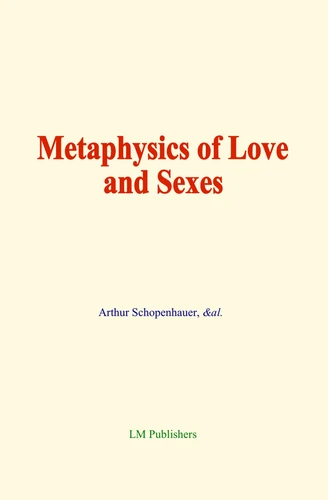
Nouveauté
Metaphysics of Love and Sexes
Par : ,Formats :
Disponible dans votre compte client Decitre ou Furet du Nord dès validation de votre commande. Le format Multi-format est :
- Pour les liseuses autres que Vivlio, vous devez utiliser le logiciel Adobe Digital Edition. Non compatible avec la lecture sur les liseuses Kindle, Remarkable et Sony
 , qui est-ce ?
, qui est-ce ?Notre partenaire de plateforme de lecture numérique où vous retrouverez l'ensemble de vos ebooks gratuitement
Pour en savoir plus sur nos ebooks, consultez notre aide en ligne ici
- FormatMulti-format
- ISBN978-2-38469-535-5
- EAN9782384695355
- Date de parution22/10/2025
- Protection num.NC
- Infos supplémentairesMulti-format incluant ePub avec ...
- ÉditeurLM Publishers
Résumé
What is love? Ask him who lives, what is life?...
We are accustomed to see poets principally occupied with describing the love of the sexes. This, as a rule, is the leading idea of every dramatic work, be it tragic or comic, romantic or classic, Indian or European. It in no less degree constitutes the greater part of both lyric and epic poetry, especially if in these we include the host of romances which have been produced every year for centuries in every civilized country in Europe as regularly as the fruits of the earth.
All these works are nothing more than many-sided, short, or long descriptions of the passion in question... Every kind of love... springs entirely from the instinct of sex; indeed, it is absolutely this instinct, only in a more definite, specialised, and perhaps, strictly speaking, more individualised form. If, bearing this in mind, one considers the important rôle which love plays in all its phases and degrees, not only in dramas and novels, but also in the real world, where next to one's love of life it shows itself as the strongest and most active of all motives; if one considers that it constantly occupies half the capacities and thoughts of the younger part of humanity, and is the final goal of almost every human effort; that it influences adversely the most important affairs; that it hourly disturbs the most earnest occupations; that it sometimes deranges even the greatest intellects for a time; that it is not afraid of interrupting the transactions of statesmen or the investigations of men of learning; that it knows how to leave its love-letters and locks of hair in ministerial portfolios and philosophical manuscripts; that it knows equally well how to plan the most complicated and wicked affairs, to dissolve the most important relations, to break the strongest ties; that life, health, riches, rank, and happiness are sometimes sacrificed for its sake; that it makes the otherwise honest, perfidious, and a man who has been hitherto faithful a betrayer, and, altogether, appears as a hostile demon whose object is to overthrow, confuse, and upset everything it comes across: if all this is taken into consideration one will have reason to ask-"Why is there all this noise? Why all this crowding, blustering, anguish, and want? Why should such a trifle play so important a part and create disturbance and confusion in the well-regulated life of mankind?"...
All these works are nothing more than many-sided, short, or long descriptions of the passion in question... Every kind of love... springs entirely from the instinct of sex; indeed, it is absolutely this instinct, only in a more definite, specialised, and perhaps, strictly speaking, more individualised form. If, bearing this in mind, one considers the important rôle which love plays in all its phases and degrees, not only in dramas and novels, but also in the real world, where next to one's love of life it shows itself as the strongest and most active of all motives; if one considers that it constantly occupies half the capacities and thoughts of the younger part of humanity, and is the final goal of almost every human effort; that it influences adversely the most important affairs; that it hourly disturbs the most earnest occupations; that it sometimes deranges even the greatest intellects for a time; that it is not afraid of interrupting the transactions of statesmen or the investigations of men of learning; that it knows how to leave its love-letters and locks of hair in ministerial portfolios and philosophical manuscripts; that it knows equally well how to plan the most complicated and wicked affairs, to dissolve the most important relations, to break the strongest ties; that life, health, riches, rank, and happiness are sometimes sacrificed for its sake; that it makes the otherwise honest, perfidious, and a man who has been hitherto faithful a betrayer, and, altogether, appears as a hostile demon whose object is to overthrow, confuse, and upset everything it comes across: if all this is taken into consideration one will have reason to ask-"Why is there all this noise? Why all this crowding, blustering, anguish, and want? Why should such a trifle play so important a part and create disturbance and confusion in the well-regulated life of mankind?"...
What is love? Ask him who lives, what is life?...
We are accustomed to see poets principally occupied with describing the love of the sexes. This, as a rule, is the leading idea of every dramatic work, be it tragic or comic, romantic or classic, Indian or European. It in no less degree constitutes the greater part of both lyric and epic poetry, especially if in these we include the host of romances which have been produced every year for centuries in every civilized country in Europe as regularly as the fruits of the earth.
All these works are nothing more than many-sided, short, or long descriptions of the passion in question... Every kind of love... springs entirely from the instinct of sex; indeed, it is absolutely this instinct, only in a more definite, specialised, and perhaps, strictly speaking, more individualised form. If, bearing this in mind, one considers the important rôle which love plays in all its phases and degrees, not only in dramas and novels, but also in the real world, where next to one's love of life it shows itself as the strongest and most active of all motives; if one considers that it constantly occupies half the capacities and thoughts of the younger part of humanity, and is the final goal of almost every human effort; that it influences adversely the most important affairs; that it hourly disturbs the most earnest occupations; that it sometimes deranges even the greatest intellects for a time; that it is not afraid of interrupting the transactions of statesmen or the investigations of men of learning; that it knows how to leave its love-letters and locks of hair in ministerial portfolios and philosophical manuscripts; that it knows equally well how to plan the most complicated and wicked affairs, to dissolve the most important relations, to break the strongest ties; that life, health, riches, rank, and happiness are sometimes sacrificed for its sake; that it makes the otherwise honest, perfidious, and a man who has been hitherto faithful a betrayer, and, altogether, appears as a hostile demon whose object is to overthrow, confuse, and upset everything it comes across: if all this is taken into consideration one will have reason to ask-"Why is there all this noise? Why all this crowding, blustering, anguish, and want? Why should such a trifle play so important a part and create disturbance and confusion in the well-regulated life of mankind?"...
All these works are nothing more than many-sided, short, or long descriptions of the passion in question... Every kind of love... springs entirely from the instinct of sex; indeed, it is absolutely this instinct, only in a more definite, specialised, and perhaps, strictly speaking, more individualised form. If, bearing this in mind, one considers the important rôle which love plays in all its phases and degrees, not only in dramas and novels, but also in the real world, where next to one's love of life it shows itself as the strongest and most active of all motives; if one considers that it constantly occupies half the capacities and thoughts of the younger part of humanity, and is the final goal of almost every human effort; that it influences adversely the most important affairs; that it hourly disturbs the most earnest occupations; that it sometimes deranges even the greatest intellects for a time; that it is not afraid of interrupting the transactions of statesmen or the investigations of men of learning; that it knows how to leave its love-letters and locks of hair in ministerial portfolios and philosophical manuscripts; that it knows equally well how to plan the most complicated and wicked affairs, to dissolve the most important relations, to break the strongest ties; that life, health, riches, rank, and happiness are sometimes sacrificed for its sake; that it makes the otherwise honest, perfidious, and a man who has been hitherto faithful a betrayer, and, altogether, appears as a hostile demon whose object is to overthrow, confuse, and upset everything it comes across: if all this is taken into consideration one will have reason to ask-"Why is there all this noise? Why all this crowding, blustering, anguish, and want? Why should such a trifle play so important a part and create disturbance and confusion in the well-regulated life of mankind?"...


















